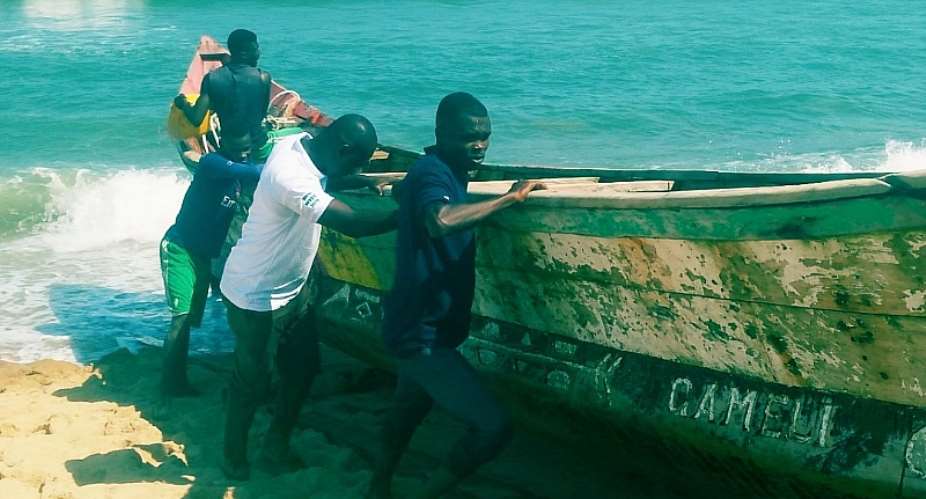A certain assignment took me to Keta, a coastal town in the Volta region, recently. After much exhaustion from the task, I decided to accompany two other colleagues for a restful walk around part of the sandy neighbourhoods including the seashores. While at the seashore and enjoying the cool Atlantic breeze, we spotted a scant group of fishermen exerting endurance to push the old GAMELI to shore for docking, so together we quickly ran to lend them our helping hands.
But, as we approached the canoe yard, the sorry looks on the faces of these fisher folks spoke volumes of the time and energy wasted because the catch that day was little. GAMELI, as the canoe is christened, in English means "there is time."
In a way, we were enthused at the sightseeing, but somehow I left the shore in Keta with harrowing memories, first, about the energy spent in pushing the huge sea-going canoe, and second, the intense feelings of despair exhibited by the fishermen.
Indeed, there may be time for doing anything, but concerning the extension of adequate government support to the fishermen in Ghana, I think, to quote Ronald Firbank, "there was a pause—just long enough for an angel to pass, flying slowly." To be honest, every first Friday in December Ghanaians celebrate National Farmers' Day. As a national holiday, the day is always set aside to acknowledge the efforts of a few outstanding farmers and fishermen with various categories of awards for working hard to feed our growing population.
However, as the December 6, 2019, which marks the 35th edition of glorifying our men and women in the Agricultural sector, is hear with us, I think there is still a lot more to be done to remedy the current plights of our fisher folks in Ghana.
In the twenty-first century, it is a common sight to see a great number of fisher folks in the various fishing communities located along the country's coast, from Aflao in the east to Half Assini in the west, still, engage in artisanal fishing using traditional canoes and orthodox fishing methods.
Today, many would agree with me that the fishermen whose occupation it is to supply fish from our deep waters to meet Ghanaians' animal protein needs are still sending abandoned refrigerators with ice blocks to fishing on the high sea to preserve their catches, in case they want to stay a bit longer on the open sea.
In fact, I do not disagree that fishermen worldwide built traditional boats with wood and powered by oarsmen, in time past. However, in more recent times many countries have made remarkable shifts in boat designing and manufacturing by using fiberglass and steels. As a result, several engine-powered or motorized fishing boats and vessels have now become the game changers in commercial fishing around the globe. The innovative vessels are decked and equipped with built-in refrigerators, and with enclosed areas designed for commercial purposes.
In all honesty, when it comes to the viability of a country's aquaculture systems and growth, I think innovation and creativity are key in making it fish-sufficient. Thankfully, Ghana's fishermen are now using outboard motors. All the same, to meet the country's growing fish consumption, there is an urgent need to revise the outmoded method of canoe fishing.
That would mean that government through the sector ministry must strategically act by engaging investors to provide modernized fishing equipment to our fisher folks to revamp the fishing industry.
Indeed, as a country, Ghana needs to support its fisher folks with standardized fishing equipment to augment their works. To do that, it behooves government to show leadership and build partnerships with fishing vessel manufacturing companies that would turn the country into a one-stop-shop or a hub for assembling tech-driven fishing boats and ships to change the current face of the fishing industry.
In closing, I want to put on record that until we become focused and collaborate with relevant partners to put modern boats and ships on our waters to turn fishing activities in Ghana into commercially viable industry, no youth would find fishing as productive and decent means of employment. I am certain any new effort could boost the country's aqua tourism as more and more people would develop interests in recreational fishing. And finally, if the country's deep-sea fishing prospects are doubled, I believe fish imports could reduce.
Komla Lokoe





 Dr. Wiafe Akenteng: Over 3,000 cured of kidney disease by award-winning Ghanaian...
Dr. Wiafe Akenteng: Over 3,000 cured of kidney disease by award-winning Ghanaian...
 Do I have to apologise for doing my security work? I won’t – Simon Osei-Mensah t...
Do I have to apologise for doing my security work? I won’t – Simon Osei-Mensah t...
 Railway Minister Peter Amewu loses 94-year-old mother
Railway Minister Peter Amewu loses 94-year-old mother
 Prestea and Bogoso mines: Complete payment of outstanding salaries not later tha...
Prestea and Bogoso mines: Complete payment of outstanding salaries not later tha...
 NDC postpones Prof. Opoku-Agyemang entry tour to May
NDC postpones Prof. Opoku-Agyemang entry tour to May
 All my businesses have collapsed under Akufo-Addo — NDC Central regional chair
All my businesses have collapsed under Akufo-Addo — NDC Central regional chair
 Military, Prison Officers clash in Bawku, three injured
Military, Prison Officers clash in Bawku, three injured
 GRA-SML contract: MFWA files RTI request demanding KPMG report
GRA-SML contract: MFWA files RTI request demanding KPMG report
 Court threatens to call second accused to testify if NDC's Ofosu Ampofo fails to...
Court threatens to call second accused to testify if NDC's Ofosu Ampofo fails to...
 Family accuses hospital of medical negligence, extortion in death of 17-year-old...
Family accuses hospital of medical negligence, extortion in death of 17-year-old...
